Abstract
In this chapter, we give new uniform central limit theorems for general empirical processes indexed by classes of sets or classes of functions. In Sect. 8.2, we consider convex sets of functions embedded in spaces of regular functions.
Access this chapter
Tax calculation will be finalised at checkout
Purchases are for personal use only
Author information
Authors and Affiliations
Corresponding author
Exercises
Exercises
(1) Use Exercise 4 in Chap. 1 to prove that the map \(f \rightarrow \Vert f \Vert _{2,\beta }\), which is defined in (8.21), is a norm on \(L_{2,\beta } (P)\).
Problem In this problem, we will prove the uniform central limit theorem of Pollard (1982) for classes of functions satisfying a universal entropy condition, in a particular case.
Let \((X_i)_{i>0}\) be a sequence of independent random variables with values in some measure space \((\mathcal{X} , \mathcal{E})\), with common law P. Let \(\mathcal{A} ( \mathcal{X})\) be the set of probability measures on \(\mathcal X\) with finite support. For any Q in \(\mathcal{A} ( \mathcal{X})\), we denote by \(d_Q\) the pseudodistance associated to the usual norm in \(L^2 (Q)\). Let \(\mathcal F\) be a class of measurable functions from \(\mathcal X\) into \([-1, 1]\). We set
where \(H (x, \mathcal{F} , d_Q)\) is defined as in Definition 8.4. The function \(x\rightarrow H (x , \mathcal{F} )\) is called universal Koltchinskii–Pollard entropy. The universal entropy of \(\mathcal{F}\) is said to be integrable if
The class \(\mathcal F\) is said to fulfill the measurability condition (M) if there exists a countably generated and locally compact space \((K, \mathcal{B} (K))\) equipped with its Borel \(\sigma \)-field and a surjective map T from K onto \(\mathcal F\) such that the map \((x, y) \rightarrow T(y) (x)\) is measurable with respect to the \(\sigma \)-fields \((\mathcal{X} \times K, \mathcal{E} \otimes \mathcal{B} (K) )\) and \(\mathcal{B} (\mathrm{I\! R})\).
I. A symmetrization inequality.
Here \(\mathcal G\) is a class of measurable functions from \(\mathcal X\) into \([-1, 1]\), satisfying condition (M).
(1) Prove that the map
is universally measurable in the sense of Definition E.1, Annex E.
(2) Let \((X'_i)_{i>0}\) be an independent copy of \((X_i)_{i>0}\). Let \(P_n\) be the empirical measure associated to \(X_1, \ldots , X_n\), as defined in (1.37), and let \(P'_n\) denote the empirical measure associated to \(X'_1, \ldots , X'_n\). Prove that the variables in (3) are measurable and that
Hint: apply Jensen’s inequality conditionally to \(X_1, \ldots , X_n\).
Let \(({\varepsilon }_i)_{i>0}\) be a sequence of symmetric independent signs, independent of the \(\sigma \)-field generated by \((X_i)_{i>0}\) and \((X'_i)_{i>0}\). Let \((X_i^s , X_i^{\prime s} )\) be defined by \((X_i^s , X_i^{\prime s}) = (X_i , X'_i)\) if \({\varepsilon }_i = 1\) and \((X_i^s , X_i^{\prime s}) = (X'_i , X_i)\) if \({\varepsilon }_i = -1\).
(3) Prove that the sequence \((X_i^s , X_i^{\prime s})_i\) is a sequence of independent random variables with common law \(P \otimes P\).
(4) Starting from (3), prove that
(5) Prove that
II. Stochastic equicontinuity of the symmetrized empirical process
Throughout Part II, we fix \((x_1, \ldots , x_n)\) in \(\mathcal{X}^n\). We assume that the class of functions \(\mathcal G\) satisfies the universal entropy condition (2). We set
Let \(Q_n = n^{-1} (\delta _{x_1} + \cdots + \delta _{x_n})\) denote the empirical measure associated to \((x_1, \ldots , x_n)\). We define the empirical maximal variance V by \(V = V (x_1, \ldots , x_n) = \sup \{ Q_n (g^2) : g\in \mathcal{G} \}\). Let \(\delta \) be any real in ]0, 1].
(1) Let I be a finite subset of \(\mathcal G\) with cardinality \(\exp (H) \ge 2\). Prove that
(2) Prove that, for any nonnegative integer k, there exists a finite subset \(\mathcal{G}_k\) of \(\mathcal{G}\) with cardinality at most \(\exp (H (2^{-k}\delta ))\) and such that there exists some map \(\Pi _k\) from \(\mathcal{G}\) into \(\mathcal{G}_k\) satisfying the condition below:
(3) Prove that, for any function g in \(\mathcal G\) and any integer l,
Infer from this inequality that
(4) Let \(\delta _k = 2^{-k}\delta \). Prove that, for any g in \(\mathcal{G}_l\), there exists a collection of functions \(g_0, \ldots , g_l\) satisfying \(g_l = g\) and \(g_k = \Pi _k g_{k+1}\) for any integer k in [0, l[. Infer that
(5) Prove that
Infer from the above inequality that
III. Modulus of continuity of the normalized empirical process
Let H be a nonincreasing entropy function such that
Let \(\mathcal{E} (\delta , P , H)\) be the set of classes of functions \(\mathcal G\) from \(\mathcal X\) into \([-1, 1]\), satisfying the measurability condition (M), such that \(H ( x , \mathcal{G}) \le H (x)\) and \(\sup \{ P (g^2) : g\in \mathcal{G} \} \le \delta ^2\). We set
(1) Let \(\mathcal G\) be any class of functions in \(\mathcal{E} (\delta , P , H)\). Prove that the class \(\{ g^2/2 : g \in \mathcal{G} \}\) still belongs to \(\mathcal{E} (\delta , P , H)\). Infer that
Starting from (8), prove that
(2) Prove that \(w(\delta ) \le 32 \varphi (\delta )\) for any positive \(\delta \) satisfying \(2^6 H(\delta ) \le n\delta ^2\).
(3) Prove that the class
belongs to \(\mathcal{E} (\delta , P , H)\) for \(H = H ( . , \mathcal{F})\). Infer that, if \(n\delta ^2 \ge 2^6 H(\delta )\), then
Apply Theorem 7.1 to conclude.
Rights and permissions
Copyright information
© 2017 Springer-Verlag GmbH Germany
About this chapter
Cite this chapter
Rio, E. (2017). Empirical Processes Indexed by Classes of Functions. In: Asymptotic Theory of Weakly Dependent Random Processes. Probability Theory and Stochastic Modelling, vol 80. Springer, Berlin, Heidelberg. https://doi.org/10.1007/978-3-662-54323-8_8
Download citation
DOI: https://doi.org/10.1007/978-3-662-54323-8_8
Published:
Publisher Name: Springer, Berlin, Heidelberg
Print ISBN: 978-3-662-54322-1
Online ISBN: 978-3-662-54323-8
eBook Packages: Mathematics and StatisticsMathematics and Statistics (R0)

